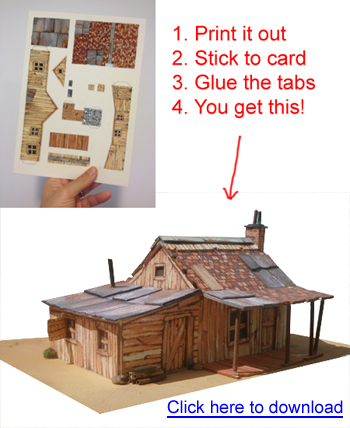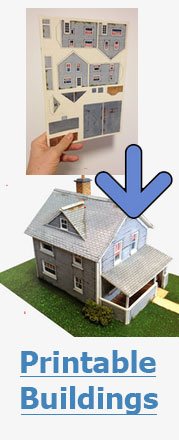“Hello Al
This occurred to me while I was re-building a badly made-up OO gauge house kit. I love poorly constructed and broken plastic building kits. They’re a bargain on eBay because no one wants them and you can get them for a song. Once you’ve taken them apart and re-assembled them, you’re left with lots of imperfections which are a challenge and fun to disguise. This is one way to do it – requires little or no skill – is very quick – and foolproof because even slip-ups look good. You can cover up glue marks, missing chunks of plastic, dodgy windows, broken guttering – all manner of mess. And it costs nothing.
The photos can’t show the results properly because they’re two dimensional. In reality the plant is proud of the wall, falls way from it in places and has texture – really appears to be growing on it. The pictures make it look ‘painted on’ but should give an impression. Here’s the process: –
(1) – Cut a short length of thread, dip it in the dark brown paint and lay it on the wall from the bottom upwards – vertically – the root branch. If it splatters a little – great – exactly what ivy appears to do. The paint itself glues the thread to the wall. Cut more lengths of thread, dip them and lay them from the main stem outwards – up and over the roof if you like – across windows – the more haphazard the better. Gently dab them down if you wish.
– Make a little paper applicator for the sawdust.
(2) – Once dry, drop blobs of glue on and around the branches, allowing plenty of brown stalk to show through. Use a matchstick to apply the glue. You’ll notice that the glue reacts with paint to give a ‘crazing’ effect and whitens – fantastic – exactly what dead ivy stalks look like.
– QUICKLY – using a the paper applicator – drop patches of sawdust into the glue – gently pat it in if you wish – leave it to dry. Just like kiddies’ glittering! You can re-apply if you want to build up the plant.
(3) – Dab blobs of green paint on and around MOST of the sawdusted areas – not all of them or you spoil the effect.
(4) – Trim off any unpainted thread ends – or dab a little green paint on them. Looks good if they stick up or fall away from the wall.
Bazinga! Tis done!
Of course you can use the same technique with tiny dabs of colour to create wisteria, climbing roses – all sorts of things. And ivy grows absolutely everywhere so it can brighten up the dullest goods yard.
Best wishes to all.
Roger.”
A big thank you to Roger. Don’t forget to leave a comment below!
And to all those still sitting on the side lines, or those just looking for inspiration, this will sort you out.
Best
Al














The exterior plant technique is very effective and something I’m going to try. However the interior of that little shop with it’s wall hanging signs and other things has to have a story also.
I am continually surprised at the ingenuity on this site.
Bravo! I’m using this idea right now and it looks good in HO.
Every day is a surprise. Thanks.
I think that is the best vining plant I have seen! It looks much more life-like than most of them…thank you. I’m one of those that buys mostly bargain cast-offs from eBay so I really need this method on some of the buildings.
Bonny/Grannytoot
great idea roger,you can always play about with colours and shades
I am constantly impressed at how the details truly make things much more interesting. Thanks for sharing this. In addition to weathering I am learning, now I have this technique in my pocket too. I have some simply fine buildings and structures I plan to do this with.
Keep on using that imagination of yours. It’s great!
Thanks for the tip. I wanted to make vines but was at a loss how to make them. I can now add vines that look real to my layout.
Don
Clever, Unique, Quick, and very satisfying. Who needs more. Thanks Roger.
Excellent suggestion. I’ll file it away for future reference. Thank you for sharing this tip.
Raymond Guyatt
Great Job Roger. Did you ever try dying your sawdust with Rit Dye. You can make most any color you want. (Poison Ivy turns bright red in the fall.) You could then use the colored saw dust in place of the green paint or add spots of color to represent flowers. A lot cheaper then turf from a hobby shop.
interesting!
kudos to you…very creative…
I LIKE THE WAY YOU PUT THE BUSH ON THE BUILDING. VERY GOOD IDEA.
Just love the way it changes the building great stuff
I have just retired and i needed something to do with all my spare time,i remembered my old dad god bless him buying a train set for my brothers and i,so thats what i got into,the only thing was the expence of it all but since getting on to alisters web site i have saved a fortune on ideas that get sent in. nice one Roger i will be trying this one out first thing tomorrow.
Great Tip Roger. Keep e’m coming
Very Clever
Thanks for sharing tips, will use it
Fred (RSA)
My dad’s a retired architect who has continually remodeled every house we’ve ever lived in, so very early on I learned the motto, “Cut to measure, beat to fit, paint to hide.” I’ve often translated that on my HO layouts as, “Cut to measure, push to fit, foliate to hide.” Your base board doesn’t quite meet at the edges? How about a nice irregular row of bushes? You had to move that structure? How about some marsh grass? This is a great example of more of the same on a building structure. Believe me, I’ll use it!
Great idea. Good job. Looks neat.
Great tips
very instructive plan to use these tips
Where do you get the trucks and figures? They are not the usual ones from the regular providers. Thanks
As an architect, the saying goes “architects hide their mistakes with ivy, doctors hide their’s with 6 feet of dirt”. I guess I can add model makers to that statement. Thanks for the tips!
This is a good tip for larger scales but it doesn’t really work for N scale. I just lay the building on its side with the wall you want the vine on up, take white glue on the end of a toothpick and run it along the building where I want the ivy to be, then sprinkle a medium green ground cover (you want it to look like leaves, not grass) over the area. Let the glue dry, tilt the building so the excess falls off, and there you have it, N scale vines. Spray it with a clear matt spray and it stays on. Mine survived a 3000 mile move sitting in a box.
Thanks for the idea. I recently moved and some of my “old buildings” will need some TLC and this is going to help. Cool idea. Thanks.